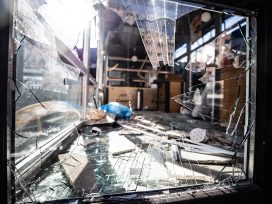The 22nd European Meeting of Cultural Journals will take place in Vilnius, Lithuania, 8 to 11 May 2009. This years meeting is organized by the European network of cultural journals, Eurozine, in cooperation with its Lithuanian partner Kulturos barai and Vilnius: European Capital of Culture 2009. The conference is part of the official programme of Vilnius: European Capital of Culture 2009 and will take place at Vilnius University; more than 100 editors and intellectuals will be participating.
Under the heading “European Histories”, this year’s Eurozine conference will explore the role of history and memory in forming new identities in a Europe in change.
Throughout Europe, history is ceasing to be something for historians alone. Instead, it is becoming both a public issue and an instrument of politics. In the West, this progression can be traced from the wilful amnesia of the postwar years, through the mission of the ’68 generation to make the previous generation accountable for its crimes, to the obsession with history of the last two decades. In the East, the imposed history of the liberation has given way to the liberation of history. Nevertheless, highly different “commemorative cultures”have formed and the comfortable historical consensus long obtained within and among western European countries has been undermined by the eastern enlargement.
Europeans are still far from an all-embracing “grand narrative”, assuming this is worth striving for at all. But much would undoubtedly be gained by discussing the existing plurality of narratives in a shared space transcending national boundaries. The Vilnius meeting will provide the opportunity for such a debate.
Twenty years after 1989, the conference will also take stock of the dramatic developments since the fall of the Berlin Wall. Meanwhile, most former communist states in central and eastern Europe are members of the EU; others are waiting in line. But the transition from closed to open societies is far from over. Fierce debates on lustration and information surfacing from previously closed archives show that, today, 1989 represents not only an historic moment of liberation but also a political and social dilemma.
Once widely known as Yerushalayim De Lita (the “Jerusalem of Lithuania”), Vilnius represents yet another facet of European history: the vibrant and tragic past and present of religious and secular Jewish culture. On the eve of World War II, Jews made up at least twenty-five per cent of the city’s population. The 2005 census counted no more than four thousand Jews in Lithuania: the result of both the Holocaust and subsequent anti-Semitic policies during Soviet occupation.
Eighty per cent of Jewish people worldwide have eastern European roots, yet how far are the countries of eastern Europe ready to integrate Jewish life and influences into their national commemorative cultures and present day identities? A third panel will discuss this and other aspects of European Jewish heritage and contemporary culture – through the prism of the Holocaust and beyond.
See here for more details for conference participants (including travel and accomodation) and the updated programme.
Published 6 March 2009
Original in English
© Eurozine
PDF/PRINTNewsletter
Subscribe to know what’s worth thinking about.


